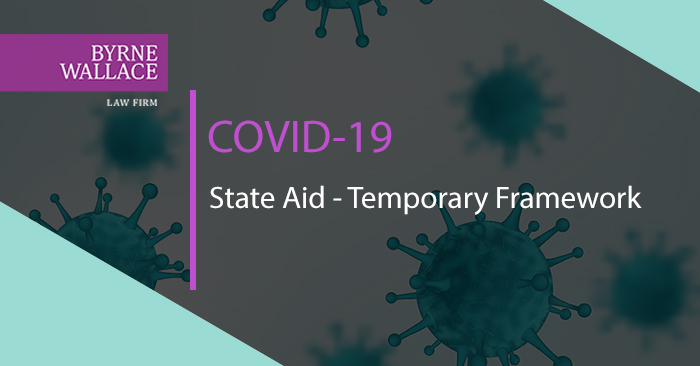COVID-19 State Aid – The EU opens the door to additional support
Wednesday, 03 February 2021
The European Commission has broadened the scope of its COVID-19 State aid Temporary Framework Communication by more than doubling the level of support that Member States can provide to many individual businesses suffering as a result of COVID-19. It has also extended the period of validity for the Temporary Framework by a further 6 months to the end of December 2021.This is the fifth (and almost certainly the most significant) amendment to the Temporary Framework since it was introduced by the Commission in spring 2020 in response to the COVID-19 outbreak.
The purpose of the Temporary Framework is to loosen the State aid rules applicable to Member State in light of COVID-19 in providing financial assistance to their economies, by imposing fewer restrictions on the aid amounts and eligible costs that can be provided to businesses. Support can be provided through a number of methods under the Temporary Framework under a number of headings, including direct grants, State guarantees, subsidised public loans, safeguards for banks lending to SMEs, and short-term export credit insurance.
The latest amendment allows for an increase in the aid ceiling applicable to “limited amounts of aid” for a shortage of liquidity from €800,000 per undertaking to €1.8 million for most sectors. The aid ceiling applicable for the agriculture and fisheries supports have also more than doubled to €225,000 and €270,000 respectively. The Commission has also increased the aid celling applicable in respect of uncovered fixed costs which was introduced in October 2020 from €3 million to €10million per undertaking, subject to a 30% loss of turnover test.
The Temporary Framework has been an extremely popular and widely used method of providing support since it was introduced. Every EU Member State has notified at least 4 measures, with a total of over 325 notifications having been made in the less than 10 months the Temporary Framework has existed. Sixty-five of these measures have had budgets of over €1 billion, including three French measures mobilising €300 billion of liquidity support for companies, a £50 billion UK “umbrella” scheme, a €44 billion Italian recapitalisation scheme to support large companies, and a German fund of up to €500 billion of liquidity and capital support.
Ireland has also made a number of notifications under the Temporary Framework, including a €200 million Enterprise Ireland scheme to support the economy, a €250 million scheme to support micro and small companies, €200 million to support R&D on COVID-19 related products, a €2 billion loan guarantee scheme, as well as a number of tourism-related measures.
It is open to Member States to decide to amend or extend the period of application of their existing Temporary Framework-notified measures or amend them in line with the Temporary Framework. The Commission will carry out a further assessment of the Temporary Framework before its expiry at the end of 2021 with a view to assessing whether it would be necessary to further extend or adapt it for 2022.
Other State aid-related measures remain available to public bodies to support business during the COVID-19 crisis either separate to or in conjunction with a Temporary Framework measure. For example, public bodies can: (i) deploy the market economy investor principle to take equity stakes in struggling businesses, (ii) provide aid of up to €200,000 per undertaking over a rolling 3 year period under the de minimis Regulation, (iii) use the Commission’s guidelines on State aid for rescuing and restricting non-financial undertakings in difficulty, or (iv) use the EU General Block Exemption Regulation to grant certain types of aid.
For further information please contact Seán O’Donnell or Robert McDermott from the ByrneWallace LLP Litigation & Dispute Resolution Team.

